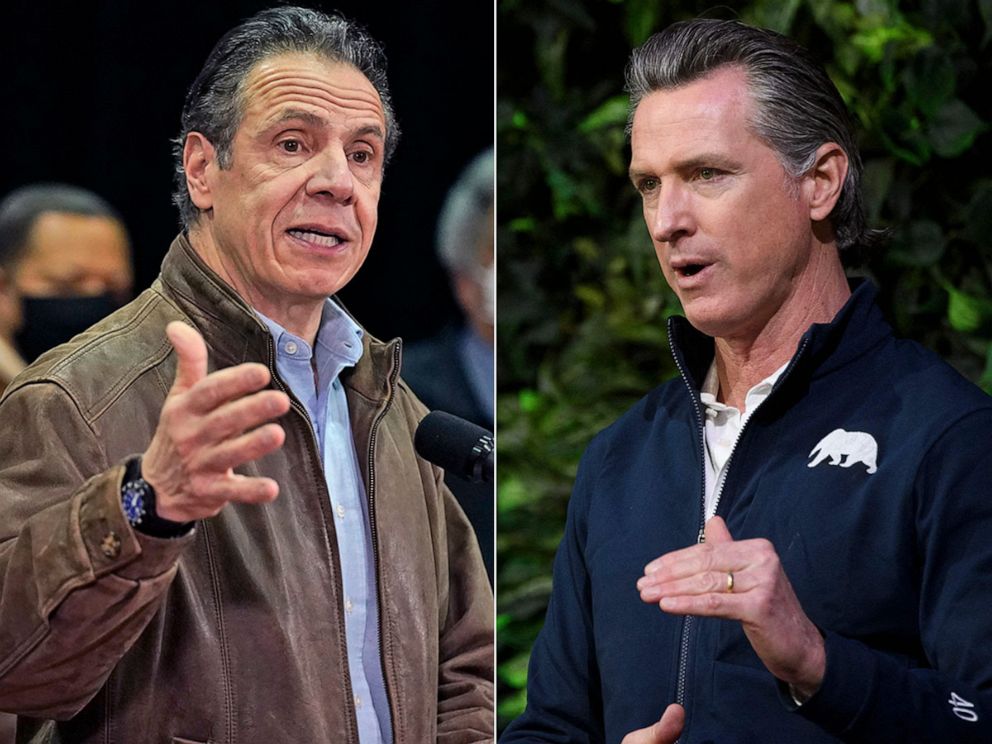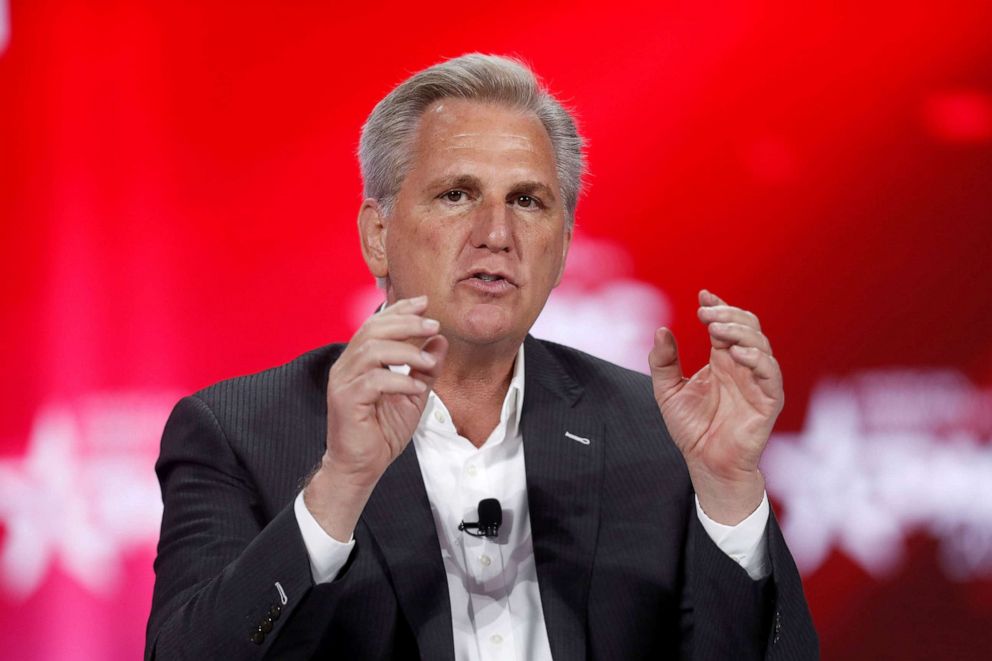Cuomo and Newsom challenge Democrats on terms they set themselves: The Note
The two Democratic governors are fighting for political survival at the moment.
The TAKE with Rick Klein
It may not come off as fair to Democrats to have to account for the actions of their own at this moment -- particularly as their GOP counterparts stay strong behind a former leader who continues to spread lies both big and small.
But Democrats should recognize the reckonings that have the governors of the nation's two largest blue states fighting for political survival at the moment.
In California, organizers claim to have enough signatures to force a recall vote against Gov. Gavin Newsom. The backlash Newsom is facing to his handling of the COVID-19 crisis hinges on a perception that some elected leaders flouted the restrictions they championed -- and a new attitude toward reopening doesn't undo damage done by infamous dinner photos.

In New York, Gov. Andrew Cuomo faces a more immediate and potentially more serious challenge to his leadership, stemming from nursing-home COVID deaths and now a second sexual-harassment allegation. Kavanaugh-era quotes about believing accusers and the need for thorough investigations are again forcing Democrats to account for standards they helped set.
Storylines like these are awkward at any time. They represent a particular challenge for Democrats' efforts to reclaim moral ground they believe former President Donald Trump surrendered, at a time that President Joe Biden is rallying his party toward what he hopes will be his first major legislative victory.
As Democrats in California, New York and beyond answer for Cuomo and Newsom, there's at least one major distinction that could have repercussions for their respective futures. Newsom appears to enjoy the united support of his home-state party, as they seek to rally against Republican efforts to push a recall.
Meanwhile, after a polarizing decade in office, Cuomo has few natural allies among powerful New York Democrats -- plenty of whom would gladly see him gone in next year's elections, if not sooner. Even his call for an outside lawyer to review allegations against him isn't being viewed in good faith by New York's attorney general.
The RUNDOWN with Alisa Wiersema
The speech Trump delivered to close this year’s Conservative Political Action Conference may have been lengthy and predictable, but it also addressed a couple of loose threads supporters and critics alike had been analyzing since he left office.
Trump addressed the major question almost immediately. “We have the Republican party,” Trump said to loud applause. “It's going to unite and be stronger than ever before. I am not starting a new party.”
The former president’s declaration about keeping the party intact came on the heels of the results of the CPAC straw poll, which said 68% of convention attendees would like to see Trump run for president again in 2024. Meanwhile, 55% said they would vote for him if the election were held today.

That support seemed to give Trump the backing to publicly pick up where he left off. Throughout his speech, he continued to peddle false claims about the validity of the 2020 election and did so despite having faced impeachment proceedings over his involvement in the Capitol Hill riots aiming to challenge the election. He even falsely teased a potential “third” presidential victory in the future, and railed on mail voting practices in battleground states he lost in November.
But while the former president has yet to officially take any steps toward a third presidential run, he’s already putting a target on the backs of politically vulnerable Republicans who had been critical of him throughout his second impeachment. During his remarks Sunday night, Trump called out nearly 20 lawmakers in the House and Senate to jeers from supporters. With 2022 races on the line, it remains to be seen whether those taunts translate into votes or whether Trump's intraparty influence cannibalizes Republican odds for crucial victories.
The TIP with Kendall Karson
For House Minority Leader Kevin McCarthy, there is "no chance" Democrats are retaining control of the chamber in 2022. "We're gonna get the majority back. We're five seats away," he told the crowd at CPAC over the weekend. He'd even bet his own house on it, he said.
McCarthy and Indiana Rep. Jim Banks signaled the party's strategy for reclaiming the House majority and it revolves one man. Largely crediting Trump with their successes in 2020, the two Republicans see his influence as crucial to reclaiming power in Congress.
"The least popular in our party are the ones who want to erase Donald Trump and Donald Trump's supporters from our party," Banks said. "If that happens, we won't win back the majority in 2022."

But not all members in the GOP's ranks are on board with a Trump-centric approach. Sen. Bill Cassidy, one of the seven Senate Republicans who voted with Democrats to convict Trump during his second impeachment trial, told CNN, "If we idolize one person, we will lose. And that's kind of clear from the last election."
As the rift over Trump continues to splinter the GOP, the party is set to be tested early in special elections this year, particularly in Texas. The increasingly competitive 6th Congressional District outside of Dallas is attracting a crowded field that includes Susan Wright, a longtime member of the state party's executive committee and the widow of the late Rep. Ron Wright, alongside Republicans with Trump ties. Sery Kim, a former official in the Small Business Administration under Trump, entered the race, while Brian Harrison, who worked in the Department of Health and Human Services in the last administration, moves closer to a run and Katrina Pierson, the former Trump campaign spokesperson, is reportedly weighing a bid, according to the Texas Tribune.
THE PLAYLIST
ABC News' "Start Here" podcast. Monday morning’s episode features ABC News’ Anne Flaherty, who tells us what the approval of a third COVID vaccine does to the outlook of the pandemic in the U.S. ABC News’ Stephanie Ramos has the latest on sexual harassment accusations brought against New York Gov. Andrew Cuomo. And ABC News’ Conor Finnegan analyzes the Biden administration’s recent responses to Iran and Saudi Arabia. http://apple.co/2HPocUL
ABC News' "In Plain Sight" podcast. In an eight-part series, author Julia Sweig explores over 123 hours Lady Bird Johnson's audio diaries, most of them never-before-heard. Her stories reveal the surprisingly powerful role she had in the Lyndon B. Johnson administration. "In Plain Sight" reveals how one vastly underestimated woman navigated the politics and polarization of her era to become one of the most influential members of the administration, even if we never knew it. http://abcn.ws/ladybird
FiveThirtyEight's Politics Podcast. As Democrats prepare to pass the American Rescue Plan, a member of the White House Council of Economic Advisers, Heather Boushey, joins the FiveThirtyEight Politics podcast to discuss what is in the relief package and why. The plan is popular — some 70 percent of Americans support it — but economists and activists are asking whether certain parts of it go too far -- or not far enough. https://53eig.ht/2PfvTbd
WHAT YOU NEED TO KNOW TODAY
Download the ABC News app and select "The Note" as an item of interest to receive the day's sharpest political analysis.
The Note is a daily ABC News feature that highlights the key political moments of the day ahead. Please check back tomorrow for the latest.




